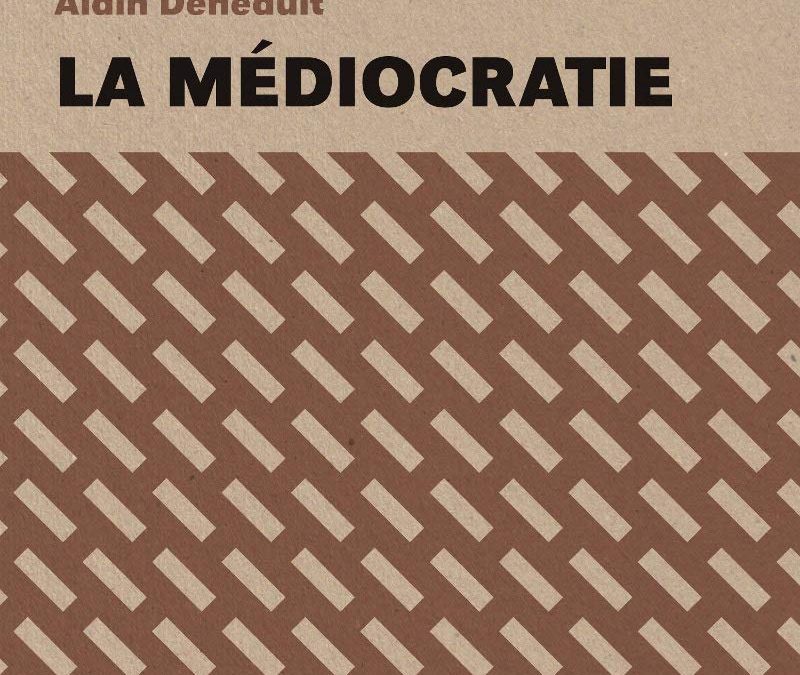Book Review
In La médiocratie (2015), philosopher Alain Deneault dissects a disturbing cultural shift: the institutionalization of mediocrity as the dominant value in contemporary society. Far from being a simple critique of incompetence, the book argues that mediocrity has become a system—one that actively suppresses excellence, rewards conformity, and hollows out intellectual and professional life.
Deneault’s work is not a partisan polemic but a philosophical and sociological investigation into why modern institutions—corporations, universities, governments, and media—increasingly favor the average over the exceptional, the bureaucratic over the visionary, and the trivial over the profound.
The Anatomy of Mediocracy
Deneault defines mediocracy (a play on “mediocrity” and “meritocracy”) as a social order where systemic structures incentivize and reproduce mediocrity rather than excellence. Unlike traditional critiques that blame individuals for laziness or incompetence, Deneault shows how institutions themselves are designed to sustain mediocrity.
1. The Rise of the “Mediocrat”
In a mediocracy, those who rise to power are not necessarily the most competent but those who best navigate bureaucratic systems. Deneault gives examples from corporate culture where managers are promoted for their ability to follow protocols rather than innovate, or in academia where scholars are rewarded for publishing quantity over quality.
“The mediocrat does not excel in any real skill but in the art of appearing competent while avoiding real responsibility.”
2. The Erosion of Language
One of the book’s most striking arguments is how language itself has been degraded into empty jargon. Corporate buzzwords (“synergy,” “disruption,” “best practices”) and political slogans replace meaningful discourse. Deneault traces this to a broader cultural shift where communication is no longer about conveying truth but about maintaining appearances.
3. The Myth of Meritocracy
While modern societies claim to reward talent and hard work, Deneault argues that true meritocracy is an illusion. Success often depends on networking, self-promotion, and adherence to institutional norms rather than genuine ability. He cites examples of industries where insiders are promoted based on loyalty rather than skill, and where original thinkers are marginalized as “difficult” or “unrealistic.”
4. The Triumph of Triviality
From clickbait journalism to reality TV, modern culture prioritizes spectacle over substance. Deneault links this to a broader societal preference for the easily digestible over the intellectually demanding. Even education, he argues, has shifted toward credentialism—where the goal is not learning but acquiring certificates that signal compliance.
Why Does Mediocrity Dominate?
Deneault identifies several structural reasons why mediocracy thrives:
- Institutional Self-Preservation – Large organizations resist change, favoring employees who maintain the status quo.
- Risk Aversion – True innovation is risky; institutions prefer predictable, mediocre outcomes over bold but uncertain breakthroughs.
- The Commodification of Knowledge – Expertise is valued only when it can be monetized, leading to superficial research and hollow innovation.
- The Cult of Efficiency – In a world obsessed with metrics, what gets measured (e.g., quarterly profits, publication counts) replaces what actually matters (e.g., meaningful progress, deep scholarship).
The Consequences of Mediocracy
Deneault’s critique extends beyond abstract theory—he shows how mediocracy affects everyday life:
- Workplaces become soul-crushing spaces where employees perform meaningless tasks to satisfy bureaucratic checkboxes.
- Education shifts from fostering critical thinking to producing obedient workers.
- Public Discourse is reduced to soundbites, making complex issues seem simple and discouraging nuanced debate.
Perhaps most disturbingly, mediocracy creates a society where excellence is not just ignored but actively punished. Original thinkers are seen as threats, innovators are dismissed as impractical, and depth is sacrificed for mass appeal.
Final Thoughts: Is Resistance Possible?
La médiocratie does not end with an uplifting call to action, but its analysis is a crucial first step. By exposing how mediocrity is enforced rather than accidental, Deneault gives readers the tools to recognize—and potentially resist—its influence.
For those tired of corporate jargon, bureaucratic stagnation, and a culture that rewards surface over substance, La médiocratie is an essential read. It won’t tell you how to fix the system, but it will help you understand why it feels so broken.
